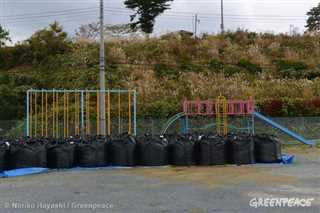Greenpeace Releases Confidential IAEA Fukushima-Daiichi Accident Report
ENERGY, 8 Jun 2015
Justin McKeating – Greenpeace International
The International Atomic Energy Agency report fails to accurately reflect the scale and consequences of the Fukushima disaster.
 The International Atomic Energy Agency’s Board of Governors meets on June the 8th to discuss its confidential Fukushima-Daiichi Accident Summary Report. The report describes itself as ‘an assessment of the causes and consequences of the accident at the Fukushima Daiichi nuclear power plant in Japan that began on 11 March 2011.’
The International Atomic Energy Agency’s Board of Governors meets on June the 8th to discuss its confidential Fukushima-Daiichi Accident Summary Report. The report describes itself as ‘an assessment of the causes and consequences of the accident at the Fukushima Daiichi nuclear power plant in Japan that began on 11 March 2011.’
Greenpeace has received a copy of the report and we made it public last week. We’ve also conducted an initial analysis of the report and our findings are not good.
Yukiya Amano, the IAEA Director General says the report is ‘an authoritative, factual and balanced assessment, addressing the causes and consequences of the accident, as well as lessons learned.’
Yet our experts find it to be full of inaccuracies, uncertainties, and that it fails to address several highly important issues. We’ve sent our findings to Mr Amano.
Here are some examples.
- The IAEA admits that radiation monitoring was not working properly in the days immediately after the Fukushima disaster began.
- Despite this uncertainty, the report downplays the health risks to the disaster’s many victims.
- This means that the estimates of the levels of radiation the people of Fukushima were exposed to cannot be trusted.
- The IAEA’s analysis of the new safety regulations in Japan are superficial at best, and they offer no evidence in the report that the Japanese nuclear industry is operating to the global highest standards of nuclear safety.
- The reality is that there are major flaws in nuclear regulation in Japan with seismic and other threats to nuclear plants safety ignored or underestimated.
- The report dismisses the environmental impact of the disaster on animal life despite scientific investigations finding measurable effects on the region’s fauna.
- The report fails to acknowledge the uncertainties that still surround the causes of the disaster. Much of the critical systems inside the reactors that melted down have not yet been inspected.
These are just some of our initial findings. There are more to come.
(You can read our full analysis of the report here. The five part IAEA report is here: part one, part two, part three, part four, part five.)
So we see, as we saw in the aftermath of the Chernobyl nuclear disaster, the IAEA trying to create a narrative that minimizes the health and environmental impacts of Fukushima, while emphasising that lessons are being learned, including in making nuclear safety regulation more effective.
In short, the IAEA is moving to protect the nuclear industry instead of the people whose lives have been destroyed by the Fukushima disaster and those who may be affected by future nuclear accidents.
This is not a surprise, a central role of the IAEA is to promote the global expansion of nuclear power. The fact that all commercial nuclear reactors in Japan – 43 in total – remain shutdown is a direct challenge to the IAEA’s mission. That is the context in which the IAEA report must be seen.
After four years, the disaster in Fukushima is still unfolding and will take many decades to address. If the work to clean up the massive damage done is to be carried out effectively and future accidents avoided as much as possible, the IAEA must demonstrate that it can change the way it operates and quickly.
The IAEA at present serves only the interests of the nuclear industry and its drive for profit at the expense of the people who have pay the ultimate price for nuclear power’s failures.
Greenpeace is calling on Mr Amano and the IAEA to suspend their consideration of the report’s findings. An open and transparent process must be established that considers the views of the people of Japan, as well as independent scientists. We stand ready to meet with representatives of the IAEA to discuss our serious concerns.
__________________________
Justin McKeating is a nuclear blogger for Greenpeace International, based in the UK.
Go to Original – greenpeace.org
DISCLAIMER: The statements, views and opinions expressed in pieces republished here are solely those of the authors and do not necessarily represent those of TMS. In accordance with title 17 U.S.C. section 107, this material is distributed without profit to those who have expressed a prior interest in receiving the included information for research and educational purposes. TMS has no affiliation whatsoever with the originator of this article nor is TMS endorsed or sponsored by the originator. “GO TO ORIGINAL” links are provided as a convenience to our readers and allow for verification of authenticity. However, as originating pages are often updated by their originating host sites, the versions posted may not match the versions our readers view when clicking the “GO TO ORIGINAL” links. This site contains copyrighted material the use of which has not always been specifically authorized by the copyright owner. We are making such material available in our efforts to advance understanding of environmental, political, human rights, economic, democracy, scientific, and social justice issues, etc. We believe this constitutes a ‘fair use’ of any such copyrighted material as provided for in section 107 of the US Copyright Law. In accordance with Title 17 U.S.C. Section 107, the material on this site is distributed without profit to those who have expressed a prior interest in receiving the included information for research and educational purposes. For more information go to: http://www.law.cornell.edu/uscode/17/107.shtml. If you wish to use copyrighted material from this site for purposes of your own that go beyond ‘fair use’, you must obtain permission from the copyright owner.